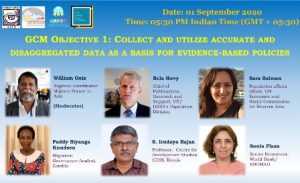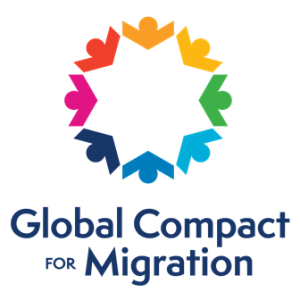Safe, Orderly and Regular Migration: Need for Prioritising Data
Prioritising data will pave the way towards understanding the more profound interrelationship between migration process and sustainable development.
As the whole world is facing the adverse impacts of COVID-19 pandemic, restrictive measures are being imposed by several countries as a short-term measure to restrict the mobility of people. In this context, there is a need to envision a world which ensures the safe, orderly and regular migration on a long-term basis. Such a long-term vision can be implemented in true spirit through the implementation of Global Compact for Migration (GCM). An international webinar was jointly organised by Migrant Forum in Asia (MFA), Cross-Regional Center for Refugees and Migrants (CCRM), Global Research Forum on Diaspora and Transnationalism (GRFDT) and Civil Society Action Committee (CSAC) to have an insightful discussion on the implementation of GCM on 1 September 2020 covering the first Objective of the GCM- “Collect and Utilise Accurate and Disaggregated Data as a Basis for Evidence-Based Policies”.
In this context, there is a need to envision a world which ensures the safe, orderly and regular migration on a long-term basis. Such a long-term vision can be implemented in true spirit through the implementation of Global Compact for Migration (GCM). An international webinar was jointly organised by Migrant Forum in Asia (MFA), Cross-Regional Center for Refugees and Migrants (CCRM), Global Research Forum on Diaspora and Transnationalism (GRFDT) and Civil Society Action Committee (CSAC) to have an insightful discussion on the implementation of GCM on 1 September 2020 covering the first Objective of the GCM- “Collect and Utilise Accurate and Disaggregated Data as a Basis for Evidence-Based Policies”.
William Gois, the Regional Coordinator at Migrant Forum in Asia, moderated the session and put forward the view that data has become a big concept in migration. However, very little of migration policies are actually based on data, which is a matter of concern. Politically, we had not reached that stage where it can be recognised that migration data can shape the policies and bring about the development. There is a need to be vigilant about the usage of data as there remains a possibility that governments might use data against migrants. There is still a lack of clarity about the data repositories in the countries, and there is a lack of data about returnee migrants.
Practicality of GCM Objectives
Bela Hovy, Chief, Migration Section, UN DESA Population Division,argued that it was a long and arduous journey to formulate the global compact for safe, orderly and regular migration and hence needs to be celebrated and cherished by the global community for its vision. Data is dedicated to the first principle of GCM, which shows its significance as usually data is relegated to the last sections or even annexes of the international agreement documents.
Data has a clear purpose of improving the well-managed migration policies and of having a better -informed discussion on migration.
Also Read : India Moving: A History of Migration
Bela Hovy suggested that there is a need to push the integration of migration during all the opportunities during national Sustainable Development Goals (SDG) reviews. GCM objectives are clear andextremely practical andhence can be achieved effectively using a bottom-up approach, starting from many low hanging fruits.
Prioritising Reliability of Data
According to Sonia Plaza, Senior Economist, World Bank, lots of policies could be based on data, but then policy analysis also needs to be done for proper implementation. During COVID-19 and thereafter, there is a need to reduce the recruitment costs. There is a need to see data from the human development perspective to ensure that it reaches to the end-beneficiary.
 It is important to collect data on stranded and transit migrants, but it is not available. There is a need to track return migration. Plaza posits that mobile data or social big data might be used, but it is inconsistent and cannot be fully reliable. There are also concerns over the privacy of data under the social media platforms including twitter data. Working with the national statistics office, civil society and research institutions on data collection on the different issues of migration is a possibility.
It is important to collect data on stranded and transit migrants, but it is not available. There is a need to track return migration. Plaza posits that mobile data or social big data might be used, but it is inconsistent and cannot be fully reliable. There are also concerns over the privacy of data under the social media platforms including twitter data. Working with the national statistics office, civil society and research institutions on data collection on the different issues of migration is a possibility.
Shahidul Haq, former Foreign Secretary, Bangladesh, points out that governments and other institutions are not willing to put resources for the data collection relating to migration. There are issues of privacy like who uses the data and what sort of data is being used after the collection. On a positive note, Bangladesh is finalising the Migration Governance Framework.
Significance of Migration Data
S.Irudaya Rajan, Professor, Centre for Development Studies, Kerala, argued that COVID-19 is not discriminating anyone, but our policies have been discriminatory, and unavailability of migrants’ database can be considered as one of the causal factors. None of the states in India were ready to handle migrants, and one of the significant reasons was the lack of knowledge about migration corridors. COVID-19 pandemic has exposed the scenariowhere every state wants remittances, but no state wants migrants.
There is a need to think about formulating National Migration Survey in India. Emigration Bill is still pending in the Parliament of India. Returned migrants can be helped as per their needs and requirements with the evidence-based data.
Cooperation and Collaboration for Migration Data
Sara Salman, Population Affairs Officer, UN Economic and Social Commission for Western Asia, stated that the first objective of the GCM on data shows that disaggregated, timely and accessible data is a precondition for achieving all the other remaining objectives. There is a need to wear the lens of migration to empower ourselves and then counter stigmatisation and discrimination being faced by migrants.There is a need to encourage collaboration and cooperation so that data from local institutions can also be utilised for successful implementation of GCM.
Several ministries like the Health and Labour have their own sets of data, but they are not shared with each other as they are almost incomparable, and hence it shows that data has lots of challenges. Multi-sectoral data for making evidence-based policies is important.
Ellene Sana, Director of the Centre for Migrant Advocacy,Philippines, emphasised the importance of data, but cautioned about the data that it might also be used against migrants as data is not neutral by nature. There is a need to put firewalls so that data is used to help migrants and not to discriminate them. Data should be used to provide services to the migrants and to advance their protection mechanisms.
Ensuring Quality of Migration Data
Paddy Siyanga Knudsen, Migration Governance Analyst, Zambia, emphasised the importance of quality of migration data. There is a need to have data in terms of targets ranging from global, national, regional to the local levels. Migration Policy Framework for Africa and Plan of Action (2018–30) is a step in the right direction for ensuring comprehensive migration data at the continental level.
Impact of the GCM has to be seen ranging from local, national, regional to the global levels, which will require accurate, reliable and valid data to truly understand the demography of the region as well as the pattern of migration.
Also Read : Migration, Migrants and the Right to the City
Paddy raised concerns over the lack of capacity-building of local agencies as they are not equipped to collect migration data. She suggested some sources like IOM’s Global Migration Data Analysis Centre, Mixed Migration Centre and IOM’s Displacement Tracking Matrix for accessing the reliable data.
Political Dimensions of Migration Data
Camilo Perez-Bustillo, Director of Advocacy, Research and Leadership Development, Texas, questioned the larger issue regarding the usage of data. From the perspective of migrant movements, the control of data can often lead to the situation of creation of life and death. In the United States, data has been used to undermine the migrant efforts. The relationship between data and power must not be undermined. Data is important in all the contests and contexts. He envisioned the migrant perspective focused on migrant liberation.
Shabari Nair, Labour Migration Specialist for South Asia, ILO Decent Work Technical Support Team, New Delhi, emphasised the importance of data in the developmental processes. If data is power, then there is a need to understand the scenario where SDGs were endorsed with unanimity, but GCM was endorsed by only 152 countries out of 193. Therefore, data is important for development, but we need to emphasise the importance of data to governments by providing political purpose and showcasing immense importance as well. Data is political also, which is quite evident through the usual conception of recruiters, most of whom only talks of promotion of migration and neglect the protection of migration.
Although GCM is non-binding in nature, it enshrines significantly inclusive guiding principles – people centric in nature; international cooperation; national sovereignty; rule of law and due process; sustainable development; human rights; gender-responsive; child sensitive; whole-of-government approach; and whole-of-society approach. It is pertinent that all respective stakeholders should prioritise the importance of data to ensure safe, orderly and regular migration. Prioritising data will pave the way towards understanding the more profound interrelationship between migration process and sustainable development envisioning a better future.
